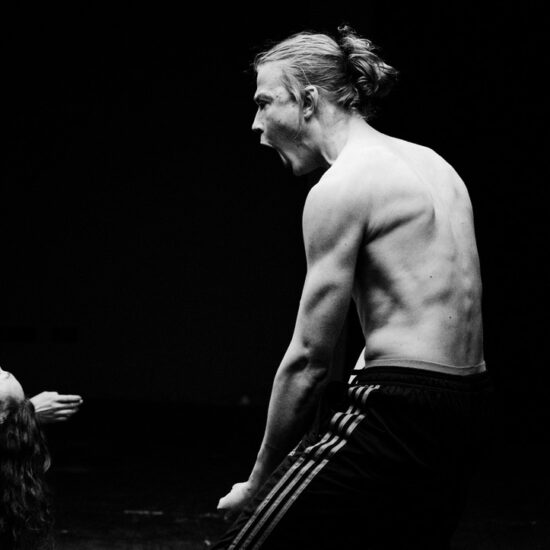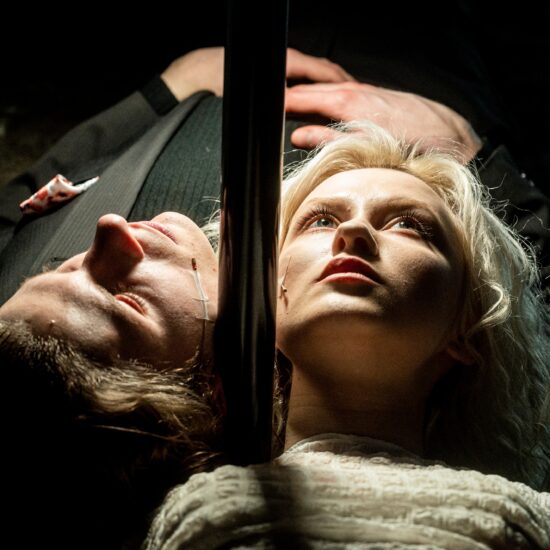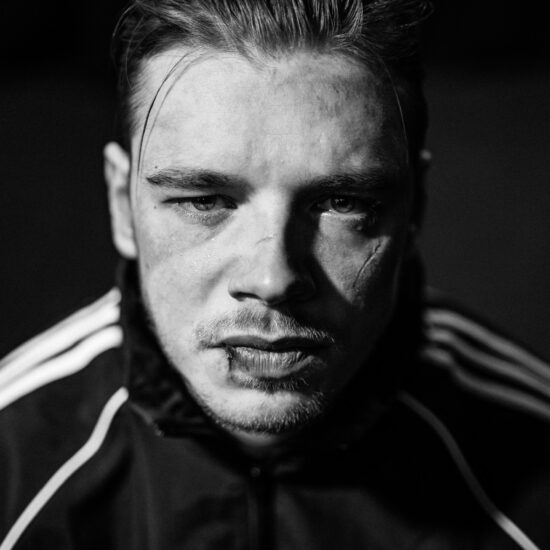OEDIPUS REX
I once watched some children play in a playground, and
it struck me how they were creating the perfect
theatrical play. When I think about my work, I often
remember the games of my childhood. The essence of
creation is concealed in a children’s playground. In
play, the child creates himself. He sets himself up in
an environment under his control. It is only in games
that the child can obtain his own freedom – a freedom
he is not usually entitled to, since he is always
dependent on the alien world of the adults. In the
playground, the child creates his identity and, this
is my belief, his destiny. The rest of his life is a
repetition of the same themes, the same games. As he
lives his life he will find, over and over again, what
he already found in the playground, and he will lose,
over and over again, what he never could find in his
games. Here, Nietzsche’s words come to mind: a man’s
maturity is a child’s play.
Oskaras Korsunovas
translated by Anders Kreuger
Oxymorones of Oedipus
Through Oedipus each individual becomes absolutely unique and majestic by his own existence. He is majestic only for he is. His fling into the world, his clash with merciless of the world’s bill, his concreteness, that is predetermined solely by simple and absolutely trite at the first glimpse fact of existence. Oedipus is trite like clouds and love, but, on the other hand, he is majestic in the same way as rustle of the dead leaves. “Son of the luck – it is the name that could serve me… The months are my family, through them I am majestic by my negligibility” – screams Oedipus, falling into the gulf of destiny; Oedipus whose pupils are stiffen. He is the mostly profaned madman. He is both: squashed and ugly, honourable and straight. Oedipus is the paradox and oxymoron by his existence. Like a human. He is the place where the crossroads of time, life, destiny and world converges and melts in his transforming depth in unexplainable way. He is the unfortunate happiness and the endless blink. He is the disdained glory and the estimable infamy. He is the blind recovery of sight and the blindness capable to see. He is father and brother for his offsprings, son and husband for his mother. He is the last waste of destiny and the symbol of fate’s realization. He is the guiltiness and the rightness, the sin and the honesty. He is the place which has no place, the point, which is impossible to localize, the time inconceivable to experience and still constantly being experienced, the incurable disease, the picture that you might see then you are incapable to see, he is the rumbling pain in the ears, he – sweet masochistic satisfaction in his own pain. He is the healthiest mental case. He is the saint killer and the killing innocence. He is the voluptuous virginity and the innocent depravity. He is possible to embrace endlessness and the endless scantiness. Oedipus is heavyweight acrobat that walks on the thinnest gossamer’s thread. That shouldn’t be, that is not the way to be, and this even doesn’t exist. Or on the contrary: he is the insolent fact of existence, the perpetual spiting of his own existence’s juice, the rippling in the undrying bog of the life’s blood. Oedipus is the ascetic overfills and perpetual event that never come true. He is the teeth dug into the flesh and the unsettling muscles of jaw. Oedipus is degeneracy on the stage, sharp and ugly whisper of embryo and the splash of himself on the cement pavement. He is extremely delicious dust of the sand under the tongue. He is the being that could become god and still is a man. He is the infidel act of belief. He is overt nerve that is shaken by the discharge of electricity. He is breathing in the airless space, and then yourself is everything you could smell. That is burned down in itself identity, which is the conflagration, fire and the moistly welcome flame. It is the self-genesis and metempsychosis that occurs in the same person, the same place, the same blink and that never comes to an end.
Kristupas Sabolius
Translation by Gediminas Pulokas
Set designer
Jūratė Paulėkaitė
Costume designer
Vida Simanavičiūtė
Aleksandras Pogrebnojus
Composer
Gintaras Sodeika
Choreographer
Vesta Grabštaitė
Light designer
Eugenijus Sabaliauskas
Percussist (Paiste)
Arkadijus Gotesmanas
Consultant
Kristupas Sabolius
Cast
CREON - Remigijus Vilkaitis
HERD OF LAIUS - Laimonas Noreika
ISMENE - Vesta Grabštaitė
JOCASTA - Jūratė Onaitytė
MESSENGER - Rimgaudas Karvelis
OEDIPUS - Dainius Gavenonis
TEIRESIAS, ANTIGONE - Egle Mikulionytė
THE PRIEST OF ZEUS - Regimantas Adomaitis
Chorus of Theban Elders:
Brigita Bublytė
Slava Čystovas
Jolanta Dapkūnaitė
Airida Gintautaitė
Vesta Grabštaitė
Gytis Ivanauskas
Arūnas Katkauskas
Eglė Mikulionytė
Rytis Saladžius
Rasa Samuolytė
Edita Užaitė
Judita Zareckaitė
Tomas Žaibus
Premiere
2002 June 26
Reviews
Kristupas Sabolius / Šiaurės Atėnai
Kristupas Sabolius / Šiaurės Atėnai
Kristupas Sabolius / Šiaurės Atėnai
GUENTHER HENNECKE / Koelnische Runschau
C. BERND SUCHER / Sueddeutsche Zeitung
PETER KLUCKEN / Rheinische Post
RUDOLF HERMES / Westdeutsche Allgemeine
CHRISTINE DOBRETSBERGER / Wiener Zeitung
STEFAN TSCHANDL / Der Standart
PETER IDEN / Frankfurter Rudschau
ULRICH WEINZIERL / Die Welt
Valdas Vasiliauskas / Lietuvos rytas
Rasa Vasinauskaitė / 7 Meno dienos
Audronis Liuga / 7 meno dienos



